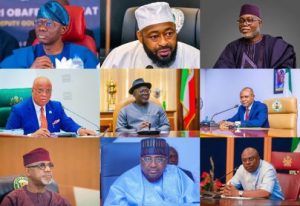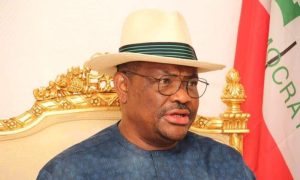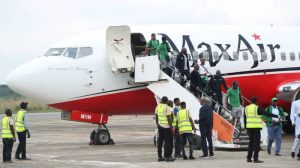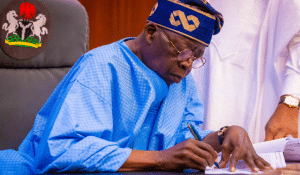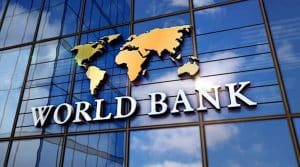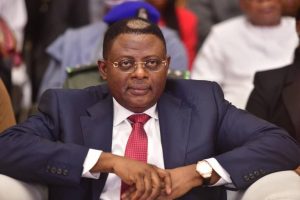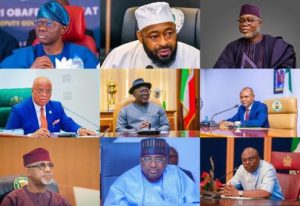
An analysis of budget performance across 29 states in Nigeria has revealed that governors spent a staggering ₦1.994 trillion on recurrent expenditures, including refreshments, sitting allowances, travel expenses, and utilities, in the first nine months of 2024.
According to Punch, the findings based on Q1 to Q3 budget performance reports from state websites, highlighted that these states secured loans amounting to ₦533.29 billion and allocated ₦658.93 billion to debt servicing within the same period.
However, the states underperformed in revenue generation, collecting ₦1.92 trillion in internally generated revenue (IGR) against a target of ₦2.868 trillion, leaving a shortfall of ₦948.28 billion.
Despite enjoying a 40% increase in statutory allocations from the Federation Account due to the removal of fuel subsidies and the unification of the foreign exchange market, the states fell short in balancing their budgets.
The Nigeria Extractive Industries Transparency Initiative (NEITI) recently noted that the Federation Accounts Allocation Committee (FAAC) disbursed ₦3.473 trillion to federal, state, and local governments in Q2 2024, a 1.42% increase from Q1.
The budget performance data for seven states—Borno, Gombe, Kaduna, Kano, Kwara, Sokoto, and Ogun—were unavailable for the review period, leaving gaps in the overall assessment.
The Federal Government received ₦1.102tn, representing 33.35 per cent of the total allocation, while 36 states received ₦1.337tn (40.47 per cent), and the 774 local government councils shared ₦864.98bn (26.18 per cent).
A comparison with the previous quarter shows that the Federal Government’s allocation decreased by ₦41.44bn (3.76 per cent), while state governments saw an increase of ₦58.13bn (4.29 per cent), and local government councils experienced a rise of ₦30.82bn (3.57 per cent).
But this improved funding hasn’t translated to an improved standard of living for its citizens.
A breakdown showed that the 29-state government spent ₦1.994tn on its recurrent expenditure, which included refreshments for guests, sitting allowances to government officials, local and foreign travel expenses, and utility bills.
The general utilities include electricity, internet, telephone charges, water rates, and sewerage charges, among others.
Lagos, Plateau, and Delta States spent the highest on their operating expenses, incurring a cost of ₦375.19bn, ₦144.87bn, and ₦121.54bn, respectively. This was followed by Ondo and Bauchi spending ₦107.34bn and ₦99.31bn.
Niger State, under the leadership of Governor Mohammed Umar Bago, was the highest borrower within the review period, obtaining loans worth ₦79.09bn. Katsina followed with a loan of ₦72.89bn. Oyo State also got a loan of ₦62.48bn.
In terms of revenue, Lagos State collected the highest of ₦912.17bn, followed by Rivers State with a collection of ₦269.18bn. Third on the list was Delta (₦97.02bn).
A state-by-state analysis revealed that Abia State, led by Governor Alex Otti, spent ₦17.91bn on operating expenses and generated ₦22.15bn in revenue, falling short of the ₦32.14bn revenue target. Additionally, the state borrowed ₦3.901bn and allocated ₦10.91bn for debt servicing.
Adamawa State spent ₦41.45bn on recurrent expenditure, while it earned ₦9.16bn income out of its revenue of ₦22.24bn. This state borrowed ₦10bn and paid ₦22.68bn to service its debts.
Akwa-Ibom State recurrent spending reached ₦85.45bn in nine months, ₦43.98bn more than its generated revenue of ₦41.47bn in nine months. The state paid ₦34.47bn as debt service but didn’t borrow.
Anambra State generated more revenue (₦28.296bn) than its recurrent spending of ₦12.70bn. It spent ₦4.56bn on debt service and didn’t record any borrowing.
The Bauchi government spent ₦99.31bn on its operating expenses. This state only got ₦15.92bn out of its budgeted target of ₦37.03bn but borrowed ₦33.64bn and paid ₦27.54bn as debt service.
Bayelsa state got ₦57.85bn IGR more than its revenue target of ₦23.87bn. It spent ₦75.23bn on its operating costs and spent ₦30.54bn on its debt service.
Governor Hyacinth Alia of Benue state approved the spending of ₦29.45bn for operating expenses while it collected ₦8.71bn as revenue out of an ₦23.91bn target. This state didn’t borrow but spent ₦5.48bn to service previous loans collected.
Similarly, Cross Rivers spent ₦55.73bn on recurring expenses, collected ₦32.42bn IGR, borrowed ₦20.67bn from its creditors and spent ₦19.99bn on debt service.
Delta state recurrent expenditure reached ₦121.54bn in nine months while it earned ₦97.02bn as revenue out of the ₦110.3bn target. The oil-rich state serviced its debt with ₦55.9bn and didn’t obtain any loan.
Also, Ebonyi State spent ₦37.73bn on its recurrent expenses but earned ₦15.67bn as revenue. The state borrowed ₦15.65bn and spent ₦8.46bn on debt service.
Edo State spent ₦75.78bn on recurrent expenditure but generated ₦52.68bn revenue. The state borrowed ₦12.84bn and spent ₦27.5bn on its debt service commitments.
Similarly, Ekiti State recurrent spending was ₦74.73bn, generated ₦23.16bn revenue, borrowed ₦11.75bn and spent ₦12.93bn to service its debts.
Enugu State spent ₦10.88bn on its operating expenses but got ₦39.98bn in revenue. This state borrowed ₦1.39bn and spent ₦6.93bn on its debt service.
Imo State under Governor Hope Uzodinma, spent ₦42.75bn on its operating expenses but got ₦15.24bn as revenue. This state spent ₦15.94bn to service its debts but didn’t obtain any loan.
While Jigawa incurred ₦35.69bn as operating expenses, it collected ₦18.41bn as revenue out of its target of ₦50.65bn borrowed ₦744.75m, and ₦2.17bn on debt service.
Further analysis showed that Katsina State spent N40.73bn on its recurrent expenditure while it generated revenue of N29.95bn. This state increased its loan by N72.89bn and paid N12.78bn as debt service.
Kebbi state recurrent spending was N22.42bn while it generated N7.86bn revenue. It also obtained an N24.59bn loan and paid debt service of N3.42bn.
Kogi State spent N84.48bn on its operating expenses but earned N19.86bn in revenue. The confluence state also obtained N51.68bn as loans and repaid N18.12bn debt.
Lagos state spending on recurrent expenses was N375.19bn, while it earned N912.15bn revenue. The state paid N84.53bn as debt service but didn’t obtain any loan.
Within the same period, Nasarawa spent N42.63bn on its operating expenses but got N22.78bn as revenue, Niger state recurrent expenses reached N41.28bn while it earned N29.22bn.
Ondo State spent ₦107.34bn on recurring expenses but only earned ₦24.43bn, Osun State spent ₦48.87bn but earned ₦28.86bn as revenue while Oyo State spent ₦51.24 on its recurrent expenditure, ₦45.79bn was collected as revenue.
Plateau spent ₦144.86bn on its recurring expenses but only earned ₦18.03bn; Rivers State’s spending on its operating costs was ₦72.69bn, but it earned ₦269.17bn.
Taraba state spending on recurrent expenditure reached ₦58.39bn, surpassing its revenue generation of ₦7.84bn, resulting in a deficit of ₦50.55bn. This state borrowed ₦52.63bn and paid ₦21.19bn.
Yobe State spent ₦51.29bn on its recurrent costs but earned ₦8.14bn as revenue. Also, Zamfara spent ₦36.34bn on its recurrent expenditure but earned ₦18.46bn.
The post 29 Governors Spent ₦1.994 Trillion On Refreshments, Sitting Allowances, Traveling, Others In Nine Months appeared first on Naija News.
